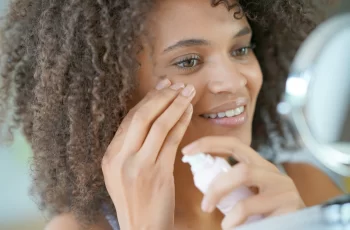
Is Retinol and Retinoid the Same?
Retinoids carry with them a lot of scientific backing clinically proven to treat frequent breakouts and minimising the appearance of ageing, such as fine lines and wrinkles. They also carry a touch of mystery as although they are one of the most popular skincare ingredients, there is still a lot of misconception about this potent powerhouses. Many find it too complicated to include in their skincare routine, others just don’t know where to begin. This is totally understandable, especially due to the fact that names retinol and retinoid are thrown around as though they are interchangeable when in fact, they are quite different. So, with that in mind, let’s find out more about them and how they actually differ.
What’s the difference between retinol and retinoid?
There are some differences between retinol and retinoids, the main one being the molecular size of these ingredients. For example, the most potent concentrate is prescriptive retinoids that are very potent and must only be used if given the all-clear by a doctor, dermatologist or trained professional. These formulas cannot be found over the counter which is exactly where retinols come into play.
Retinol is a form of retinoids and you will often find them in a variety of products that are readily available in stores and online. Although they are derived from retinoids the formulas for OTC products contain other ingredients designed to reduce their potency making them easier to add to a routine by allowing your skin to build its tolerance without severe side effects, such as redness, rashes, skin irritation and other reactions that retinoids often cause. Bear in mind however that depending on the formula, some of the listed side effects can still occur so using the product correctly is vital.
What is retinoid?
Retinoids are a form of vitamin A that are often found in all varieties of skincare products, sometimes found in over the counter but more than often formulated into prescription products. Highly potent and contain a variety of skincare benefits from combating signs of acne and problematic skin, it is able to do this by exfoliating the outer layer of the skin ridding it of excess sebum and build-up of dead skin cells that over time result in active spots and other blemishes, such as blackheads.
Although it has gained its reputation as being the most effective ingredient to clear the skin of breakouts it is also widely praised for its ability to reduce the appearance of ageing, such as fine lines, wrinkles and expression lines. It is able to promote the production of collagen resulting the surface of the skin to appear smoother and plumped.
When it comes to retinoids you can expect to find the most powerful formulas are available through prescription only, however there are many forms of retinol found in over the counter blends that come in an array of strengths and price tags.
What is retinol?
Retinols are in fact a type of retinoid found in non-prescriptive products, but instead available easily online or in selective stores. You can expect to find retinol to provide the same skin benefits of retinoids when introducing this into your skincare routine. What you may find is retinols are generally a lower concentrate compared to the levels of active ingredient found in retinoids. This also means that the products found OTC (over the counter) are usually easier to introduce into your daily regime just as long as they are used correctly. If you needed help clearing things up a little and figure out how you can introduce retinol you can check out the dedicated blog post all about the skincare benefits of retinol and why they are so good for the skin.
By having a lower concentrate of retinoid in the formulas you will find OTC will work more gradually on the skin, one thing to remember is the different names types of retinols are listed under such as, retinyl palmitate, retinyl linoleate, retinaldehyde, retinyl acetate and propionic acid. You can find all of these listed in the ingredients list of the product packaging and depending on when they are listed will show how potent the concentrate is, ideally you would like the retinol to appear in the top 5 remembering that for products that aren’t prescribed are often blended with other ingredients such as hyaluronic acid to create balance and help the formula to be easier and less potent to apply to the skin.
Is retinoid better than retinol?
Both retinoid and retinol perform similar skin benefits and can improve your skin but come in different levels of concentrates. This simply results in you having the option of finding the best product for you to use for your skin and in your daily routine. If you are wanting to get right to the bottom of this and focus on the ingredients alone, then yes, retinoid is better than retinol. But considering you can only find retinoids through prescription you will find that retinol provides the same results but is a lot gentler and can take a couple of months to start showing the full skin results.
Is retinol weaker than retinoid?
The best way of thinking about retinoid and retinol is the fact they are not identical sisters, but in fact cousins. Related, but not exactly the same. If you find yourself suffering from severe acne and breakouts resulting with you having to consult with a GP or dermatologist, chances are you will be prescribed with a retinoid. Due to the fact they are medical grade standard the potency of the concentrates is higher and at a level you won’t be able to find over the counter which technically means retinol is weaker. This, however, doesn’t result in the products you can find containing retinol are not effective but are considered a lot easier to include into your routine without the worry of the formula being too harsh on the skin. Having said that retinol is still one of the most potent ingredients available in the industry and needs to be applied to the skin slowly. I would first suggest using it once a week in the evenings to begin with, this will build the skin’s tolerance and will hopefully avoid skin irritation or flare-ups.
Hopefully now you have a little more understanding of the admittedly tricky but popular skin ingredients, in all honesty it doesn’t matter if it’s a retinoid or retinol you’re using, so long as you are using one, after all, your skin will never look so good! If you have any further questions about retinol (or retinoid) you can private message me over on our Instagram.


